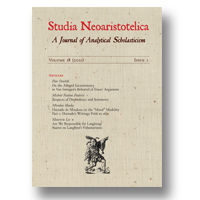|
1.
|
Studia Neoaristotelica:
Volume >
20 >
Issue: 1
John A. Demetracopoulos
Leonardo da Vinci’s Aphorism on the Aristotle-Alexander Legend: Sources, Meaning, And Its Reception by Francis Bacon
abstract |
view |
rights & permissions
| cited by
One of Leonardo da Vinci’s autographed aphorisms states that Aristotle and Alexander were each other’s teachers. Interpreting it in light of those of Leonardo’s readings which instigated him to write it down along with providing him the material he needed to do so, I argue that the aphorism turns against Aristotle as an emblematically boastful, know-it-all man involved in undue occupation of all knowledge throughout history. Leonardo presents Aristotle as if he had been taught by the pernicious conqueror Alexander to act in scholarship in the way the Macedonian king had acted in politics and external affairs. The core of this critique goes back to a traditional anti-Aristotelian point in Antiquity, complies with the 15th- and 16th-century anti-Aristotelianism and goes hand-in-hand with Leonardo’s own view that intelligent men (including himself) are capable of going much further than Aristotle in the direction of discovering the truth. I identify Leonardo’s sources and I argue that Francis Bacon’s repeated bitter remark that the soul of Aristotle was infected by Alexander’s tyrannic character was quite probably based on Leonardo’s aphorism.
|
|
|
2.
|
Studia Neoaristotelica:
Volume >
20 >
Issue: 1
Lanell M. Mason
Meeting Harman’s Challenge:
A New Theory of Moral Properties and Perception
abstract |
view |
rights & permissions
| cited by
Gilbert Harman, in a well-known thought experiment, evokes the intuition that moral value can be perceptually seen. However, Harman dismisses the intuition, contending that moral concepts and judgments are the products of agent psychology and do not map onto mind-independent objects. Robert Audi, attempting to account for moral perception himself, fails to meet Harman’s challenge since his own ontological commitments do not allow for objects that moral concepts can map onto. This paper will offer an alternate theory of moral perception that maps moral concepts onto mind-independent entities, thereby meeting Harman’s challenge. To accomplish this, I offer that moral properties are not supervenient but are relational properties which possess their own non-reducible phenomenology.
|
|
